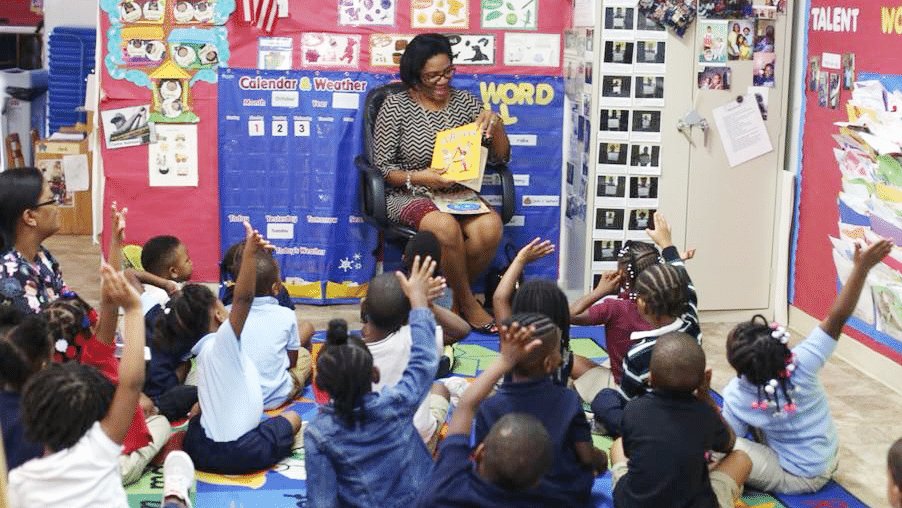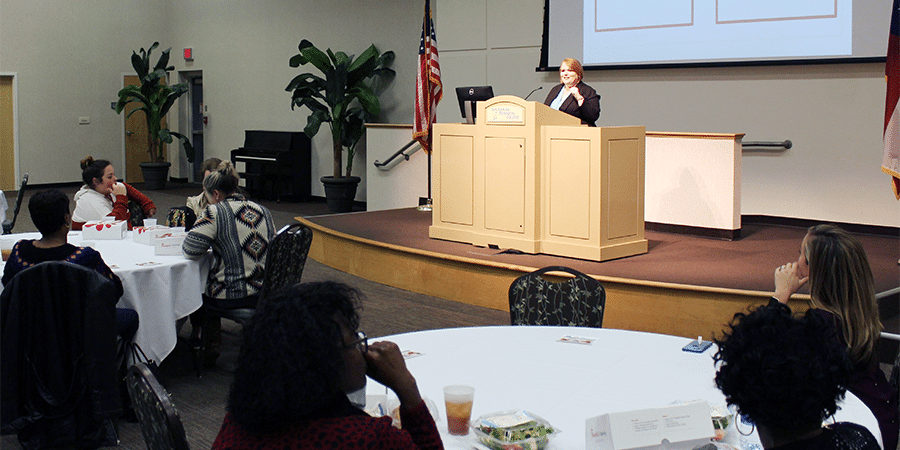Taking Care of Georgia’s Youngest Citizens
Print This Post
East Point Mayor Deana Holiday Ingraham reads to students during the 2019 Georgia Pre-K Week.
Access to quality child care not only helps children and their families; it can also be a strong economic development tool for cities.
by Sara Baxter
What do we do with the little ones?
That question is on the minds of many parents who need to work, but struggle to find accessible, affordable child care for their young children. It’s a question employers and communities have to grapple with as well.
Ensuring that quality early child care that is safe and developmentally appropriate for children from birth to age five is available to working parents has far reaching effects for everyone involved: children, parents, employers and the community.
For babies, toddlers and preschoolers, good child care promotes brain development, social skills and early education, which lays the groundwork for success in school and in life. With their children in a safe place, parents have the ability to work, earn an income, provide for their families and progress upward. In turn, employers have an available workforce that is productive, with lower absenteeism. Communities that can provide a skilled workforce become more attractive to businesses, which impacts the economy.
“Research shows that Georgia loses $1.75 billion dollars in economic activity annually due to parent challenges with child care,” says Jill O’Meara, community partnerships and projects manager with Bright from the Start: Georgia Department of Early Care and Learning (DECAL). “If parents can’t go to work or don’t have child care that is safe, affordable and high quality for their children, our economy suffers. High quality child care is important for everyone.”
Promoting Early Child Care and Education
With a budget of $905 million for FY 2021, DECAL is responsible for meeting the child care and early education needs of Georgia’s children and their families. That includes licensing child care centers and home-based child care, of which there are nearly 4,500 centers serving Georgia’s children from birth to age 5.
DECAL, established in 2004, has several programs to promote high-quality early learning services at the community level, including Georgia’s Race to the Top-Early Learning Challenge Grant Early Education Empowerment Zones (2014-2018). In 2018, DECAL created a Community Partnership Unit to continue DECAL’s commitment to community-based work. Initiatives in this unit are designed to connect community stakeholders with resources and offer a communication link between DECAL and community leaders.
All child care facilities must be licensed in the state of Georgia. But they can also choose to go a step above and earn a Quality Rating of one, two or three stars, known as Georgia’s Quality Rating and Improvement System (QRIS), that helps determine the quality of their programs.
“By participating in this voluntary program, child care facilities make a commitment to work continuously to improve the quality of care they provide to children and families,” O’Meara says.
DECAL also oversees the Child Care and Parent Services (CAPS) program, which provides scholarships to help low-income families pay for the cost of child care. Last year, DECAL implemented a requirement that all eligible CAPS providers be Quality Rated by December 31, 2020 to continue to receive funding. (NOTE: This deadline was extended to at least December 2021 due to Covid-19.)
Against the backdrop of everything DECAL does to help promote quality child care for Georgia’s littlest citizens, here are three examples of what communities are doing to combat this issue.
Helping to Achieve Quality
When the Savannah Economic Development Authority (SEDA) realized that 115 of its 200 child care centers – with the capacity to serve 3,566 children – were at risk of no longer being able to serve children receiving CAPS scholarships unless they earned a Quality Rated rating by December 31, they knew they had to do something.
“We were responding to a crisis,” says Leia Dedic, SEDA’s vice president of strategy and partnerships. “We realized many of the centers just needed a little help.”
To answer this need, SEDA created the Workforce Initiatives Fund, a $375,000 fund that provides mini-grants to licensed child care centers in Chatham County who are trying to achieve a Quality Rating from DECAL.
“These mini infrastructure grants help put them over the top in terms of achieving the rating,” says Dedic. “They can provide funding for minor repairs, playground improvements and classroom items – anything that can improve safety and/or help their ability to serve families.” Since the program began in January, Dedic estimates they’ve given about 38 grants totaling about $50,000. Because the program has been extended, the grants will continue into next year.

The child care capital improvement mini-grant application process was unveiled in March 2020. Source: Nick Robertson/Savannahnow.com.
The Workforce Initiatives Fund is a collaboration between SEDA, the United Way of the Coastal Empire and Child Care Resource & Referral (CCR&R) of Southeast Georgia at Savannah Technical College. The United Way is the administrator of the grants, and oversees the activity. CCR&R verifies that the funds requested will go towards items that will improve their evaluation scores to ultimately achieve Quality Rated status.
Dedic calls this “historic” because nothing like this has ever been before by SEDA, and, according to CCR&R, not even in the southeast.
“It is a different approach to achieving our mission,” she says. “We are taking a holistic approach to workforce development by supporting quality childcare, a strategy that can have long term benefits. According to the research, for every $1 we invest in quality early learning, we get $8-$16 returned to the community. It’s a win for everyone.”
Making Quality Child Care a Priority
In Athens, city officials are trying to make sure quality child care is available to every child that needs it.
“It is the goal of the entire commission to provide quality child care and youth development to the area,” says Athens-Clarke County Mayor Kelly Girtz. “There are 1,000 children in our area below the age of five who do not have access to child care.”
Last November, Athens-Clarke County passed a $314 million special purpose local option sales tax (SPLOST) package for several big projects that will improve Athens, including the construction of a new judicial center and a new Classic Center Arena, as well as building affordable housing downtown.
The plan is to include at least one child care center in one of the new buildings, making child care more accessible to those who work and live in downtown Athens.
The commission also just recently passed six tax allocation districts, and it plans to direct funding in one of those districts to youth support.
“We’re thinking that with every big development tool, we look for ways to marry multiple needs,” he says. “And we are planning ahead to make sure we have all of the tools in the tool box.”
The benefits of early education hit home for Girtz, who spent the first part of his career as a teacher and school administrator. He is also a member of GMA’s Children and Youth Council.
“I believe it’s our responsibility as city and county leaders to leave behind a better place,” he says. “And one way to do that is to invest in early child care and youth development, and to make sure child care struggles become nonexistent. Solving child care problems is good for the children, for the families and for the city of Athens.”
Connecting Resources
Like her counterpart in Athens, East Point Mayor Deana Holiday Ingraham has a background in education and a passion for children and early childhood education. She has spent her career as an advocate for youth and education, and now is currently special projects manager for the Georgia Statewide Afterschool Network. She also chairs GMA’s Children and Youth Advisory Council.
So, it makes sense that as mayor, she and her city council have made early child care a priority.
In 2015, the city established the Joint Learning Committee, comprised of school leaders, city officials and leadership from business, faith-based and nonprofit sectors with the goal of improving education, increasing parent and youth engagement and enhancing workforce development. Early child care is a part of that.
“We have representatives from our early child care centers in the room with school principals asking how they can work together to help create a pipeline,” says Ingraham. It’s part of her philosophy of what she calls “connectedness.”
“We connect people to resources,” she says. “That’s how we maximize our resources and magnify our impact. We are building bridges to restoratively connect our children and families to resources and help them reach their full potential.”

East Point hosted Quality Rated training for child care providers on June 1, 2019.
Last year, she “connected” area child care centers to Quality Rated training by offering a city building to DECAL at no charge to hold a training session. She estimates about 50 centers – from both East Point and the greater Atlanta area – participated. In East Point, she says 13 centers are Quality Rated and seven more are going through the process.
“Early child care starts young children on a positive trajectory and keeps them on that path,” Ingraham says. “Having quality child care is vital – and we have to ask ‘what can we do to make sure that everyone has the same access and same opportunities, regardless of the environment in which they were born.’”
A Win-Win-Win Situation
These three cities are mobilizing efforts to help answer the question of who is taking care of Georgia’s youngest children. And when child care is available, it is beneficial to everyone.
“Early care and education generates $4.7 billion of economic activity in Georgia,” says DECAL’s O’Meara. “We know that child care has a lot of long-term benefits. For example, children who attend high-quality child care are more likely to read on grade level, less likely to be engaged in juvenile crime, more likely to graduate high school and graduate college and be active members of the workforce. For all of those reasons, quality child care is essential.”
For more information, please see DECAL’s Economic Impact Report.
Read part four of this 12-part series, “Engaging Youth When They Are Out of School.”
Sara Baxter is a freelance writer based in Decatur, GA. She specializes in telling stories for nonprofit organizations.
Contact:
Kelli Bennett
GMA Communications Director
678-686-6242
gacities.com/Contact/Staff/99583
Krystin Dean
GaFCP Communications Specialist
404-739-0043
krystin@gafcp.org
Follow us on Twitter: @gafcpnews
Connect with us on Facebook.
Georgia Municipal Association anticipates and influences the forces shaping Georgia’s cities and provides leadership, tools, and services that assist municipal governments in becoming more innovative, effective and responsive.

